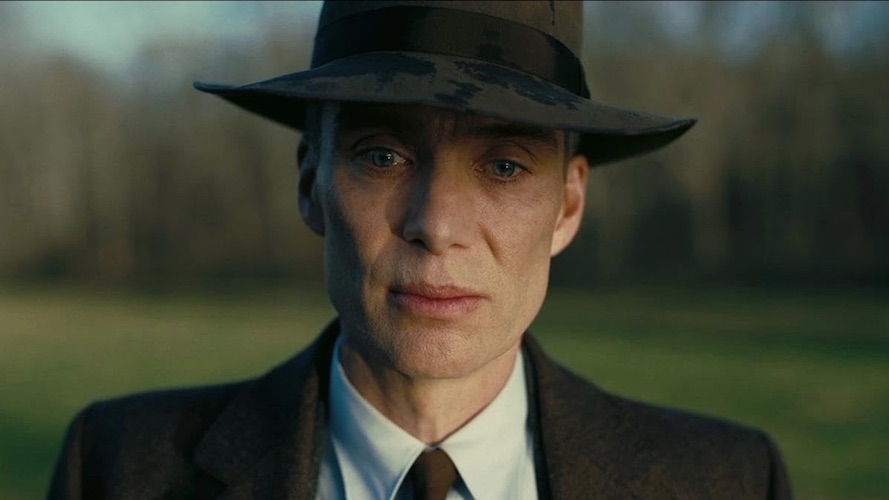
I don’t consider myself a Christopher Nolan acolyte, even though I count two of his films among my favorites. More often than not, I feel that his overreliance on exposition undermines his ambition. I did not feel that way watching his latest epic, Oppenheimer, a riveting cinematic experience that explores the life of J. Robert Oppenheimer, the father of the atomic bomb. Because of Oppenheimer’s biopic nature, Nolan turns his expository tendencies into an attribute as he meticulously expounds on a man who built his life around a branch of physics few of us understand: quantum mechanics.
Nolan approaches Oppenheimer from two completely different perspectives. The first, unsurprisingly, is from the point of view of the titular character, played by Cillian Murphy. It begins just before Oppenheimer’s 1926 departure from Cambridge to study theoretical physics in Germany, and ends in 1963 when he’s presented with a Presidential Award. After efficiently establishing the key figures in Oppenheimer’s life, not to mention his intimidating intellect (he taught himself Dutch in just six week so he could use it to deliver an entire lecture on quantum theory), two distinct chapters of his life become the dominant focus; engineering the development of the first atomic bomb, and the subsequent undoing of his reputation and political influence by postwar McCarthyism.
The second perspective comes from someone who doesn’t exactly leap off of the pages of history, but who’s extremely important nonetheless. His name was Lewis Strauss, the chairperson of the Atomic Energy Commission, for which Lewis tried to recruit Oppenheimer after the war had ended. Strauss, played in old age makeup and gray hair by Robert Downey Jr., recalls his uneasy relationship with Oppenheimer to an aide while attending a Senate confirmation hearing. In just one of his many stylistic touches, Nolan contrasts the differing perspectives of Oppenheimer and Strauss by using color film for Oppenheimer’s POV and black & white for Strauss’s, which not only helps in keeping track of whose head we’re in, but also beautifully symbolizes how differently they each think.
Oppenheimer’s dialog-driven historical drama is atypical for Christopher Nolan, but his fondness for juggling multiple timelines hasn’t waned. Nor has his kinetic filmmaking style of rapidly cutting between disparate scenes accompanied by an aggressively persistent background score designed to create a sense of urgency, with abrupt silence, rather than musical crescendos, punctuating the dramatic moments. I usually find Nolan’s hyperbolic manipulation of sound and image exhausting. Here, though, it works, helping Oppenheimer’s three-hour runtime feel much shorter.
Several actors manage to distinguish themselves from the massive cast of top-notch talent, including Matt Damon as the Lieutenant General in charge of the Manhattan Project; Benny Safdie as Oppenheimer’s thorny colleague and intellectual foil; Emily Blunt as his fiery, alcoholic wife; and Gary Oldman as a self-satisfied Harry Truman. But no character, in this or any of Nolan’s previous work, is as complexly drawn as Cillian Murphy’s Oppenheimer, who’s presented as intelligent yet naïve, scientific yet philosophical, honest yet secretive, prone to getting lost in thought contemplating whirling electrons and nuclear fusion, and, in the end, a tortured soul. Nolan refrains from passing judgment on Oppenheimer – leaving that to us, if we so choose – suggesting instead that it’s within our inherently contradictory human nature to create as well as destroy. Considering how now, more than at any other time since the Cuban Missile Crisis, we’re all living under the shadow of Oppenheimer’s creation, Oppenheimer is THE movie of our time.
For KSQD’s Film Gang, this is Paul Kanieski
Would you like to join The Film Gang and write & record movie reviews to air on KSQD? If so, please contact the Program Director, Howard Feldstein: programs@ksqd.org










